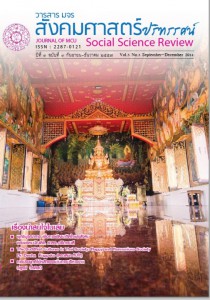วัฒนธรรมชาวพุทธในสังคมไทย : สังคมสงบสุขและสามัคคี
บทคัดย่อ
ในฐานะที่เป็นดินแดนที่อุดมไปด้วยวัฒนธรรม ประเทศไทยเป็นที่มาบรรจบกันแห่งวัฒนธรรมโลกที่หลากหลาย อันเป็นผลมาจากการที่คนไทยยอมรับเอาวัฒนธรรมเหล่านั้นเข้ามาโดยง่าย นั่นทำให้วัฒนธรรมประเพณีมากมายผสมกลมกลืนจนแยกไม่ออกและได้ปฏิบัติสืบทอดกันมาเป็นเวลาอันยาวนาน ซึ่งทำให้ตลอดทั้งปี ประชาชนชาวไทยได้เพลิดเพลินกับวัฒนธรรมประเพณีมากมายรวมทั้งงานรื่นเรงต่างๆ อันแสดงให้เห็นถึงความเป็นเอกลักษณ์ของวัฒนธรรมไทย อนึ่ง วัฒนธรรมประเพณีอันเป็นของชุมชนคนในชาติซึ่งแสดงถึงลักษณะอันเป็นเอกลักษณ์และสร้างสรรให้เกิดความเป็นน้ำหนึ่งใจเดียวกันระหว่างชุมชนต่างๆ คุณค่าของวัฒนธรรมมีส่วนช่วยในการควบคุมพฤติกรรมโดยอัตโนมัติ ซึ่งทำให้สมาชิกในของกลุ่มสามารถอยู่ร่วมกันในสังคมไทยได้อย่างสงบสุข
ในความเป็นจริง ชีวิตของชาวไทยได้เกี่ยวข้องกับพระพุทธศาสนาตั้งแต่เกิดกระทั่งตาย จนไม่สามารถแยกออกจากกันได้ ตัวอย่างเช่น เมื่อแรกเกิด พ่อแม่จะไปวัดเพื่อให้พระตั้งชื่ออันเป็นมงคลแก่เด็ก เป็นต้น และเมื่อเจริญวัย ก็จะสอนให้เด็กๆ รู้จักกราบพระรัตนไตรก่อนนอน และให้ทำความเคารพพระสงฆ์ ซึ่งโดยทั่วไปแล้ว ครอบครัวชาวพุทธจะทำบุญตักบาตรพระสงฆ์ทุกเช้า เพื่อเป็นการสั่งสมบุญและเพื่อเป็นการทำหน้าที่อุบาสกอุบาสิกาในการทำนุบำรุงพระพุทธศาสนาอันเป็นการช่วยสืบทอดอายุพระพุทธศาสนาอีกทางหนึ่งด้วย และเมื่อเด็กชายเจริญวัยเป็นผู้ใหญ่ พ่อแม่ก็จะจัดการงานบวชให้ตามประเพณี อย่างน้อยหนึ่งพรรษา พอจะแต่งงานมีครอบครัวก็ต้องนิมนต์พระ พอจวนจะสิ้นลมก็ให้นึกถึงพระ หรือแม้แต่ประเพณีเกี่ยวกับคนตายก็ล้วนเกี่ยวข้องกับพระ อนึ่ง แม้แต่ทางบ้านเมืองจัดงานหรือเทศกาลต่างๆ ก็ล้วนแต่มีพระเข้ามาเกี่ยวข้องเสมอ ดังนั้น สามารถจะสรุปได้ว่า ตั้งแต่อดีตกระทั่งปัจจุบัน ประชาชนชาวไทยไม่สามารถอยู่ได้หากปราศจากพระพุทธศาสนา ซึ่งถือว่าเป็นศาสนาแห่งปัญญาและมีบทบาทอย่างมากในสังคมไทย ลักษณะเฉพาะของชาวพุทธไทยที่น่าทึ่งนั่นคือการรู้จักปรับตัวให้เข้ากับสิ่งแวดล้อม ในฐานะที่เป็นศูนย์รวมจิตใจ พระพุทธศาสนาช่วยให้เกิดความสามัคคี ความมั่นคงและความสงบสุขของคนในชาติ ในรูปแบบของขนบธรรมเนียมประเพณีและเทศกาลต่างๆ ซึ่งช่วยให้กลุ่มต่างๆ สามารถอยู่กันได้อย่างสมัครสมานสามัคคี
เอกสารอ้างอิง
Alexandra R. Kapur-Fic. Thailand: Buddhism, Society and Women. New Delhi: Abhinav Publications, 1998.
Bhikku Nanamoli (tr.). Visudhimagga (The Path of Purification). London: The Pali Text Society, 1964.
Bradley Winterton. The Insider’s Guide to Thailand. Hong Kong: CFW Publishers Ltd., 1989.
Buddhadatta, A.P. Mahāthera. English - Pali Dictionary. Delhi: Motilal Banarsidass Publication, 1980.
Chadin Nuprasert. Theravāda Buddhism and Hinduism: A Comparative Study in Morality. Thesis Submitted for Ph.D. Department of Philosophy & Religion, Banaras Hindu University, 2000.
David Keen. “Her Majesty the Queen’s Foundation.” in Sawasdee. Vol. 25. Bangkok: Thai Airways International Public Company Limited, August 1996.
Eugene Watson Burlingame (tr.). Buddhist Legends. Part 3. Oxford: The Pali Text Society, 1990.
Grissana Taruno (Buchagul). The Concepts of Suffering in Theravada Buddhism: An Analytical Study. (Thesis Submitted for Ph.D. Department of Philosophy & Religion, Banaras Hindu University, 1997.
Hare, E.M. (tr.). The Book of the Gradual Sayings. Vol. III. Oxford: The Pali Text Society, 1988.
Horner, I.B. (tr.). The Collection of the Middle Length Sayings. Vol. III. Oxford: The Pali Text Society, 1993.
___________. The Book of the Discipline. Vol. IV. Oxford: The Pali Text Society, 1993.
H.R.H. the late Supreme Patriarch Prince Vajirananavarorasa. Dhamma Vibhaga. Part two. 3rd ed., tr. by Siri Buddhasukha. Bangkok: Mahamakut Buddhist University, 1995.
Malalasekera, G.P.. Dictionary of Pali Proper Names. Vol. I. New Delhi: Munshiram Manoharlal Publishers Pvt. Ltd., 1998.
Office of the National Culture Commission (The Ministry of Education). Thai Life: Our Ancestors. Bangkok: Kurusabha Publishing House, 1994.
Pali–Thai–English–Sanskrit Dictionary. 4th ed. Compiled by His Royal Highness Prince Kitiyakara Krommaphra Chandaburinarunath. Bangkok: Mahamakut Rajavidyalaya, 1994.
Phra Dhammapitaka (P.A. Payutto). Dictionary of Buddhism. 9th ed. Bangkok: Mahachulalongkorn Press, 2000.
Phramaha Kasem Laksanawilas. The Buddhist Way to Peace: A Critical Study. Thesis Submitted for Ph.D. Department of Philosophy & Religion, Banaras Hindu University, 1994.
Phramaha Preecha Parinyano. The Ancient Ceremonies of Isan Thai. Ubonratchathani: Siridhamma Printing House, 1987.
Plaek Sonthirak. Rite and Tradition. Bangkok: Religious Publishers, 1990.
Putrie Viravaidya, M.R.. “His Majesty King Bhumibol Adulyadej of Thailand.” in Festival of Thailand in India. Published by Office of National Culture Commission on the occasion of the Celebrations of His Majesty King Bhumibol Adulyadej’s Golden Jubilee. Bangkok: Religious Printing Press, 1997.
Rhys Davids, T.W. and William Stede. Pali–English Dictionary. Delhi: Motilal Banarsidass Publishers, 1993.
Sak Phasuknirantara. Administration of Thailand. Bangkok: The State Council Press, 1971.
Sanit Samakkarn, Prof.. The Cultural Evolution of Thai Society. Bangkok: O.S. Printing House Co. Ltd., 1991.
Sherlekar, S.A. “et. al..” Industrial Organisation and Management. 3rd ed. (reprinted). Bombay: Himalaya Publishing House, 1988.
Sulak Sivaraksa, “et. al.” (ed.). Socially Engaged Buddhism for the New Millennium: Essay in Honor of the Ven. Phra Dhammapitaka (Bhikkhu P.A. Payutto) on His 60th Birthday Anniversary. Bangkok: The Sathirakoses-Nagapradipa Foundation for Children, 1999.
Sumet Methavidyakun, Asst. Prof.. Concept of Ritual. Bangkok: O.S. Printing House, 1989.
Sunthorn Plamintr. Getting to Know Buddhism. Bangkok: Buddhadhamma Foundation, 1994.
Sutthivong Pongpaiboon, Prof. (ed.). Encyclopaedia of the Southern Thailand. Vols. 8. Bangkok: Amrintra Printing, 1968.
Suryakanta. Sanskrit-Hindi-English Dictionary. New Delhi: Orient Longman Ltd., 1995.
Thiranantho. Thai Auspicious Ceremony. Bangkok: Duangkaew Publishers, nd..
Thanapol Chadchaidee. Essays on Thailand. 7th ed. Bangkok: Thaichreun Printing, 1999.
Woodward, F.L. (tr.). The Book of the Gradual Sayings. Vol. II. Oxford: The Pali Text Society, 1992.
ดาวน์โหลด
เผยแพร่แล้ว
รูปแบบการอ้างอิง
ฉบับ
ประเภทบทความ
สัญญาอนุญาต
ลิขสิทธิ์ (c) 2018 วารสาร มจร สังคมศาสตร์ปริทรรศน์

อนุญาตภายใต้เงื่อนไข Creative Commons Attribution-NonCommercial-NoDerivatives 4.0 International License.
เพื่อให้เป็นไปตามกฎหมายลิขสิทธิ์ ผู้นิพนธ์ทุกท่านต้องลงลายมือชื่อในแบบฟอร์มใบมอบลิขสิทธิ์บทความให้แก่วารสารฯ พร้อมกับบทความต้นฉบับที่ได้แก้ไขครั้งสุดท้าย นอกจากนี้ ผู้นิพนธ์ทุกท่านต้องยืนยันว่าบทความต้นฉบับที่ส่งมาตีพิมพ์นั้น ได้ส่งมาตีพิมพ์เฉพาะในวารสาร มจร สังคมศาสตร์ปริทรรศน์ เพียงแห่งเดียวเท่านั้น หากมีการใช้ภาพหรือตารางหรือเนื้อหาอื่นๆ ของผู้นิพนธ์อื่นที่ปรากฏในสิ่งตีพิมพ์อื่นมาแล้ว ผู้นิพนธ์ต้องขออนุญาตเจ้าของลิขสิทธิ์ก่อน พร้อมทั้งแสดงหนังสือที่ได้รับการยินยอมต่อบรรณาธิการ ก่อนที่บทความจะได้รับการตีพิมพ์ หากไม่เป็นไปตามข้อกำหนดเบื้องต้น ทางวารสารจะถอดบทความของท่านออกโดยไม่มีข้อยกเว้นใดๆ ทั้งสิ้น





